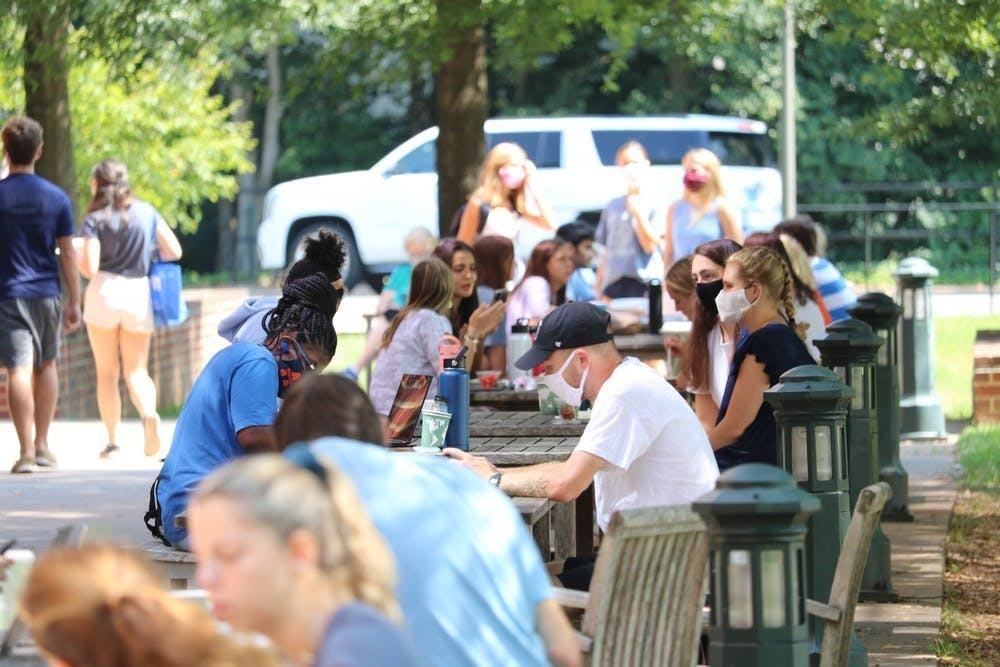While adjusting to a pandemic-altered semester, students have learned how to develop personal plans for safely socializing and going about daily life. They have also navigated difficult conversations with roommates and peers on how to best limit the risk and spread of COVID-19.
According to University guidelines, students are allowed to gather in groups of no more than 10 individuals at a time. Students must also follow other University restrictions, which include wearing masks, maintaining a physical distance of six feet and limiting visitors and travel to and from Charlottesville.
As students continue to assess their personal risk-reduction strategies, whether at home or still on Grounds, the Centers for Disease Control and Prevention recommends limiting risk by frequently washing hands for at least 20 seconds. If students are considering going out to places like a restaurant or gym, they can call ahead to ask about the COVID-19 safety measures in place. Additionally, students are practicing preventative measures amongst their friends and family any time they decide to gather.
Second-year College student Eva Parios stressed the importance of wearing a mask frequently while avoiding large groups and only socializing with her small circle of four friends.
“It’s been hard because different people have different ideas of cleanliness and what’s safe to do, but we are trying our best,” Parios said in a text to The Cavalier Daily. “I think things like eating out and meeting with two or three friends are just risks I’m willing to take for the sake of my own mental health.”
Meredith Hayden, associate executive director of Student Health and Wellness, advises students to continue to follow University guidelines as well as gather outdoors if possible, as it is generally safer due to better ventilation than indoor areas.
In order to try to reduce the spread of the disease, students should maintain a small, consistent group of individuals whom they can socialize with, and most importantly, they should stay home if they are feeling sick, Hayden said.
“As we head into colder months, public health officials are concerned about possible [increases] in COVID-19 spread,” Hayden said. “It will be important to continue the use of masks and physical distancing when you must be indoors with those who aren’t your housemates.”
As students continue to develop plans for staying safe, Jamie Leonard, director of the Office of Health Promotion, recommends scheduling an appointment with a Peer Health Educator for confidential conversations on risk-reduction strategies. The Peer Health Educators have also created worksheets that can help guide students to communicate expectations and boundaries with roommates and peers.
For second-year College student Lindsey Davidson, it is important that she maintain open communication with her roommates. She suggested that in-person conversations are the best way to discuss expectations during the pandemic.
“My roommates and I have talked about how many people we each see and what activities we are all comfortable with,” Davidson said in a text to The Cavalier Daily. “We also continue the conversation and have an understanding that we can all change our minds.”
Parios says that it is necessary to discuss one’s preferences on safety measures with roommates and friends as well as listen to their concerns.
“Some of my friends will text [saying] they weren’t as socially distanced as they would have liked to be the day before and so they won’t be getting close ... for a couple weeks,” Parios said. “Normalize this. It’s not weird — it’s respectful.”
Before this year’s winter break, the University offered free COVID-19 testing to all students — living on- or off-Grounds — before they returned home. The University also asked students to not return to Grounds until the start of the spring semester.
Davidson took extra precautions before traveling home to Vienna, Va. for Thanksgiving recess, including only meeting with friends in a socially-distanced manner and refraining from participating in any activities that may have required her to remove her mask around others, like eating food.
“It has definitely been difficult because on one hand [my friends and I] all know we will not see each other for a couple of months, but we also don’t want to risk getting exposed and bringing [COVID-19] back to our families,” Davison said. “This has made the end of this semester seem much more challenging than those in the past.”
For Parios, her mitigation strategies did not change considerably before she returned to Warrenton, Va. However, she decided to cancel her Thanksgiving plans in order to avoid seeing anyone outside her immediate family.
“I’ve canceled my ‘friendsgiving’ as well after noticing the rising cases and would encourage others to consider doing the same,” Parios said. “It's been a long year but we can’t just throw in the towel now. We’re hearing some promising news about a vaccine so please stay COVID conscious for just a few more months!”
As students look ahead to the holidays, they must once again adapt their risk-reduction plans to another environment. Above all else, Leonard suggests that students focus on what activities they can do safely.
“It is paramount that students have frequent and honest conversations about their comfort level and boundaries and be respectful of the boundaries of others,” Leonard said in an email to The Cavalier Daily. “Students may need to avoid certain activities or people that are higher-risk. This can be uncomfortable, but it may be necessary.”







